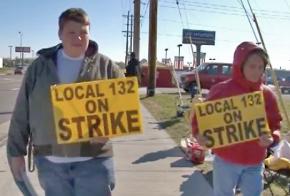Hostess workers draw a line
reports on a strike by bakery workers at Hostess Brands.
AFTER YEARS of accepting concessions while the giant food company Hostess Brands was in bankruptcy, bakery workers said "Enough!"--and hit the picket line across the country on November 9.
In September, the workers--represented by the Bakery, Confectionary, Tobacco Workers and Grain Millers International Union (BCTGM)--overwhelmingly rejected Hostess' latest offer, which included deep cuts to wages and benefits. After a bankruptcy judge imposed the contract anyway, union members responded by walking out.
Initially, only five plants struck, but seven others soon joined them. Now, workers at 13 more plants are honoring the picket lines set up by strikers. Operating Engineers are also honoring the picket lines.
The Teamsters union is not officially honoring the picket lines, but many individual Teamsters are refusing to cross. Teamsters accepted a concessionary contract similar to the one the bakery workers rejected in September--which included a 10.5 percent wage cut and an increase of $76 per week in employee health and welfare payments.

The contract Hostess wants to impose on BCTGM workers includes:
-- An immediate 8 percent wage cut.
Shifting 20 percent more of health care costs onto the workers (for some workers, this would mean an increased cost of $240 a month for medical insurance).
Eliminating retiree Medigap insurance, which covers gaps in Medicare.
Eliminating Pension Supplement to pay health and funeral costs.
Closing an undisclosed 10 to 12 plants.
Eliminating the eight-hour day, which would mean no time-and-a-half pay after eight hours per day.
In addition, the company illegally froze pension contributions mandated under the contract for all of 2012, in violation of federal law. This is still being contested before the National Labor Relations Board.
THESE TAKEAWAYS follow years of the union accepting concessions as Hostess pleaded poverty during its bankruptcy. The BCTGM agreed to do this with the assurance that the company would use the savings to reinvest in the company to make it economically viable.
Instead, the company--which is now run by a private equity firm, Ripplewood Holdings, and two hedge funds--has treated the Hostess plants as a cash cow for its speculative activity.
Executives at Hostess, of course, haven't suffered. In 2002, Hostess granted its CEO a 300 percent raise, and at least nine top executives received raises between 35 percent and 80 percent. Since 2002, the company has had six CEOs---none of them could turn the company around, but all of them were paid many times what workers get, and they got golden parachutes as they left.
Workers on the line realize that the strike may push Hostess into liquidation, as the company has threatened. On November 12, the company announced the permanent closure of its Seattle and St. Louis plants.
Workers feel that they aren't just striking for themselves. As one worker in Seattle put it, "We know we will probably lose our jobs, but if we accept these concessions, standards for bakers and other workers will keep going down. We are taking it on the chin for workers all over."
Workers on the line universally blame mismanagement by executives, from the top on down. As one Teamster honoring the line in Seattle put it:
They ran this place into the ground. They don't know how to plan production. From this plant alone, they overproduced $30,000 of product every week that they had to discount and send to thrift stores right away. That $30,000 loss could cover a lot of wages.
During the recession, when other companies cut prices, they raised theirs! What kind of sense does that make? In this plant, they appointed an engineer to run the bakery. Why not a baker, who really knows how to run a bakery?
Workers also say that Hostess wastes money by not following the cost-saving practices of other bakers, buying its ingredients week-to-week rather than when prices are lowest. Bakery workers feel that behind the mismanagement is the corporation's attitude of making a quick profit instead of planning for long-term viability.
The prospects of the few thousand workers left at Hostess keeping their jobs with decent pay and benefits are very slim. The BCTGM has promised to help workers with filing for unemployment compensation and retraining.
This strike is one of many examples of corporations trying to void or weaken union contracts using bankruptcy laws. Unfortunately, workers are some of the last to be compensated when a company is liquidated. Other creditors always come first.
In the past, the response of union leaders has been to accept the need for concessions but to try to limit them as much as possible. But once concessions are accepted, the companies come back demanding more. Other companies then say they have to compete by demanding the same or deeper concessions from their workers. Often, even very profitable companies use this strategy. The race to the bottom spirals.
In this case, the workers have held the line and refused further concessions, even in the face of losing their jobs. They realize that if they accept further concessions, their jobs will likely be lost soon anyway.
Workers everywhere who want to end the race to the bottom need to support the workers at Hostess.


